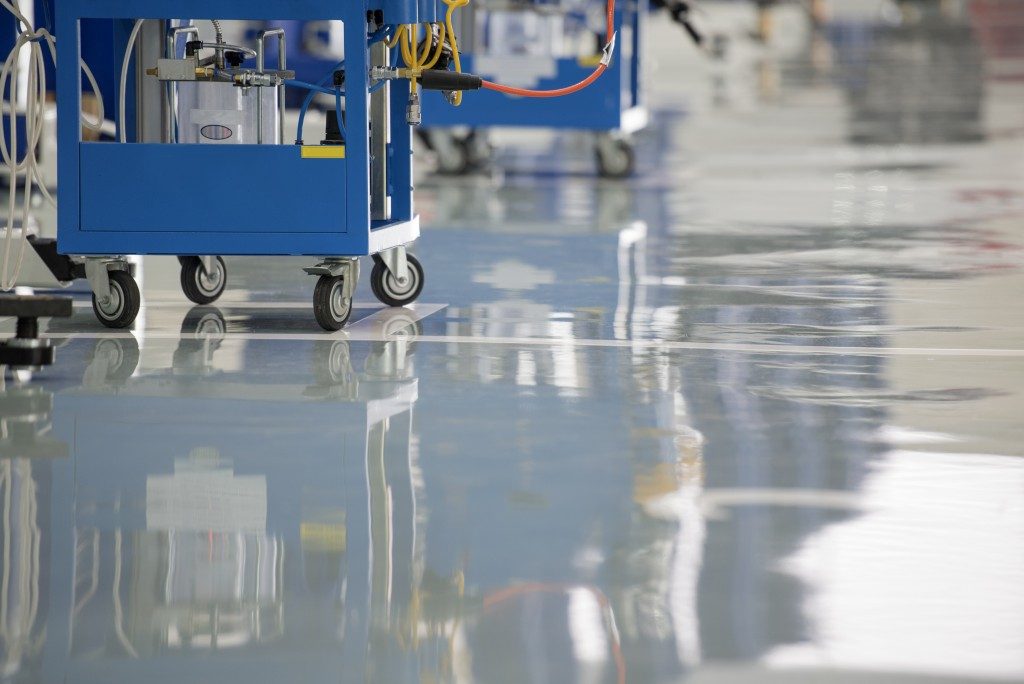Epoxy floor coating is a durable and versatile option for flooring. The distinguishing feature of epoxy floor coating is that it uses a two-part epoxy (hence the name) which is a mixture of hardeners and tough polymer resins which react to one another to harden and form a tough floor coating. Epoxy coating can be used for industrial and commercial establishments, as well as schools, hospitals, and even homes. They can even last and withstand high-temperature areas such as near deserts in Utah. Most are resistant to chemicals, water, slippage, weight, and impact.
However, there are different types of epoxy floor coatings that one needs to keep in mind since each of them are suited for different types of projects/settings:
Self-Leveling Epoxy.
Self-leveling epoxy coatings are one of the most commonly used types. The epoxy coating is applied over concrete floors (whether they’re new, old, or cracked), and result in a smooth and durable leveled floor. They look shining and unified as one piece and could come in many colors, and even a “clear/transparent” option and could fit in most settings. Self-leveling epoxy is quite versatile and customizable that it can be used almost everywhere, from production floors to factories, warehouses and showrooms, gyms and athletic courts, or simply residential areas such as the kitchen or garage.
Epoxy Mortar Floors.
Epoxy mortar floors require a strict procedure and are often only done professionally. It is up of a combination of pure solid epoxy and quartz or graded sand. It can also be used to repair, cover, and protect damaged concrete. Mortar system flooring is highly resistant to chemicals, weight, and impact. It can also be used as a base for another epoxy (i.e. having an epoxy mortar floor cover concrete floor, and using self-leveling epoxy to cover the epoxy mortar floor). With the epoxy mortar floor’s increased durability, they are often used in warehouses, factories, and manufacturing plants, but are still used in commercial establishments such as restaurant kitchens and service garages.
Quartz-Filled Epoxy Floors.
This flooring is made of a combination of colored or stained quartz grains and high-performance polymer resin. They are very as durable (due to the inclusion of quartz grains), and is as slip-resistant as most epoxy floor coatings, but are much more decorative. They are often used for areas with customers or clients, or establishments with high foot traffic such as schools, hospitals, showrooms, and offices.
Epoxy Flake Floors.
Similar to quartz-filled epoxy floors, epoxy flake floors are highly decorative but utilize colored flak materials that are inserted into the epoxy to give a distinct crystalline aesthetic. The flakes also have grooves that make it more slip-resistant. These are used mostly in sports venues, showrooms, clinics and commercial food establishments.

Anti-Static Epoxy Floors.
These floors contain epoxy resin mixed with a conductive material to dissipate any discharge. Anti-static epoxy floors or electrostatic charge (ESD)-resistant floors are specialized for facilities that consider static to be a safety hazard, such as those handling flammable and caustic gases and liquids, as well as electronic and pharmaceutical facilities.
With these in mind, you’ll be able to better decide which type of epoxy coating would best be used for your next construction or floor project.
